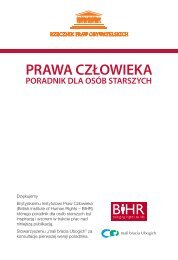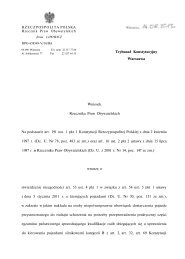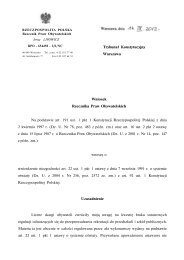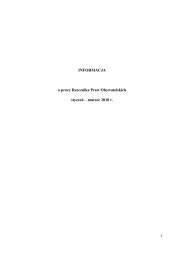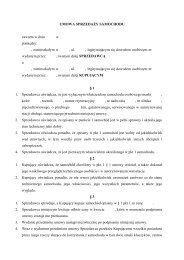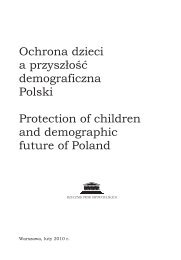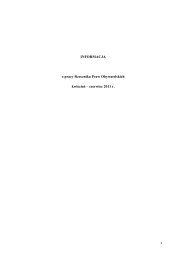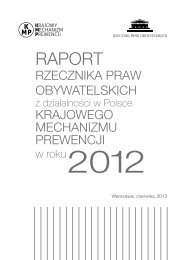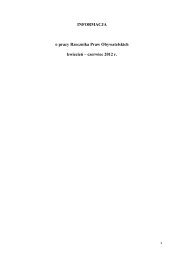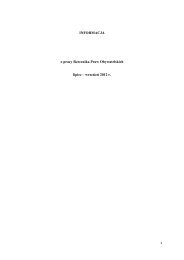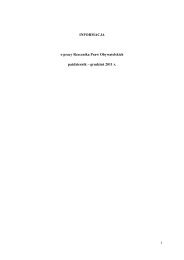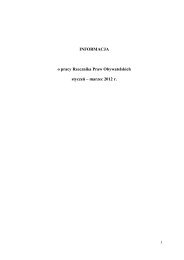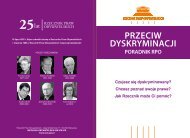Prawa człowieka w krajach Partnerstwa Wschodniego UE z ...
Prawa człowieka w krajach Partnerstwa Wschodniego UE z ...
Prawa człowieka w krajach Partnerstwa Wschodniego UE z ...
You also want an ePaper? Increase the reach of your titles
YUMPU automatically turns print PDFs into web optimized ePapers that Google loves.
not the only issues discussed: at the same time, measures were taken in order to establish an<br />
effective mechanism to evaluate the level of protection of the rights of persons in the<br />
respective member States. Such system, according to K. Annan 29 , would be founded on peer<br />
review and would complement the existing procedures of the UN treaty bodies.<br />
The previous attempts to create a universal system to report the overall human rights<br />
performance of the states based on the Universal Declaration of Human Rights proved to be a<br />
failure and were abandoned in 1980. 30 The reporting mechanisms established within the<br />
framework of the respective UN treaty bodies, beginning with the system implemented under<br />
the International Convention on the Elimination of All Forms of Racial Discrimination and<br />
established in successive Conventions, turned out to be much more successful. Despite certain<br />
differences in the respective Conventions and the structure of their corresponding treaty<br />
bodies 31 , the reporting systems had certain features in common. Each Treaty obliges the State<br />
Parties to submit reports detailing the measures taken by them to ensure the protection of the<br />
rights and freedoms established pursuant to the given Treaty. The reports are submitted to the<br />
UN Secretary-General, who forwards them for review by the competent treaty body. The<br />
treaty bodies are authorised to express their opinion 32 , which can then be commented on by<br />
the State Party concerned. Each treaty body has developed its own system of interactions with<br />
the State Parties, one element being the presence of state representatives during the<br />
formulation of the opinion of the treaty body on a given report. Notwithstanding the success<br />
of the reporting mechanisms established on the foundation of treaty bodies, their form is not<br />
faultless. From the perspective of the overall UN system to protect human rights and<br />
freedoms, treaty-based reporting inherently prevents recovery of information from a State that<br />
has not ratified a certain convention and is thus not obligated to submit reports concerning the<br />
protection of the rights and freedoms covered by that convention to the UN. Besides,<br />
atomisation of the reporting systems in the respective treaty bodies and the actual procedural<br />
differences, despite the aforementioned similarities, significantly hinders the attempts at a<br />
29<br />
Addendum to In larger freedom, Human Rights Council: Explanatory note by the Secretary-General,<br />
23.05.2005, A/59/2005/Add.1.<br />
30<br />
F. de Gaer „ A Voice Not an Echo: Universal Periodic Review and the UN Treaty Body System”, Human<br />
Rights Law Review 7:1 (2007), s. 117.<br />
31<br />
Committee Against Torture (CAT), Committee on the Elimination of Discrimination against Women<br />
(CEDAW), Committee on Economic, Social and Cultural Rights (CESCR), Committee on the Elimination of<br />
Racial Discrimination (CERD), Committee on the Rights of the Child (CRC), Committee on the Protection of<br />
the Rights of All Migrant Workers and Members of their Families (CMW), Human Rights Committee (HRC).<br />
32<br />
Referred to in the Treaties as “comments”, “general comments”, “general recommendations” or<br />
“suggestions”.<br />
34



